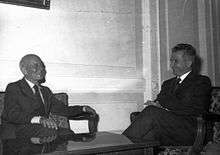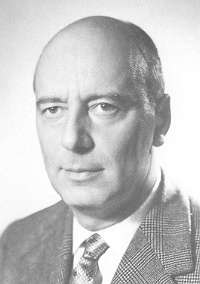Giancarlo Pajetta
Giancarlo Pajetta (June 24, 1911 – September 13, 1990) was an Italian communist politician.

Giancarlo Pajetta | |
|---|---|
 | |
| Member of the Chamber of Deputies | |
| In office 25 June 1946 – 13 September 1990 | |
| Personal details | |
| Born | 24 June 1911 Turin, Italy |
| Died | 13 September 1990 (aged 79) Rome, Italy |
| Nationality | Italian |
| Political party | Italian Communist Party |
| Occupation | Journalist, politician |
Pajetta was born in Turin and become a member of the Italian Communist Party (PCI) during his youth. He attended Liceo Classico Massimo d'Azeglio in Turin for his sixth form/senior high school studies.[1] In 1927, this earned him a two-year prison sentence. In 1931, he went into exile to France, becoming the Italian representative to the Communist International.
In 1933 Pajetta secretly went to Parma to convince some Fascist members to abandon that party, but was discovered and sentenced to 21 years. He was freed at the fall of the Fascist regime on August 23, 1943 and subsequently took part to the partisan resistance in the Brigate Garibaldi.
In 1944, together with Ferruccio Parri and Alfredo Pizzoni, he was appointed as president of the Comitato di Liberazione Nazionale (National Liberation Committee) of northern Italy (then still under German occupation). He became also Chief of Staff of the partisan military forces.
In 1948 Pajetta become member of the National Secretariat of the PCI, with responsibility for its international relationships (he was member, among the others). It remained in the national secretariat until 1985. He was also elected in the Italian Parliament from 1946 until his death, and in the European Parliament in 1984. He was also repeatedly director of L'Unità (PCI's newspaper) and of the Marxist periodical Rinascita.
Pajetta was one of the most respected members of PCI after World War II. He was a member of migliorista current with other figures such as Giorgio Amendola and Giorgio Napolitano, often in contrast with the lines of the party's leader (like with Palmiro Togliatti). At the death of secretary Enrico Berlinguer in 1984, Pajetta was considered too old to succeed him; he also opposed to Achille Occhetto's project of transformation of PCI into a social-democratic force (the future Democratic Party of the Left, or PDS).
Pajetta died suddenly in his Rome house in September 1990, before the dissolution of PCI. His funerary ceremony was followed by some 200,000 people.
Bibliography
- Le crisi che ho vissuto (1982)
- Il ragazzo rosso (1983, autobiography)
- Il ragazzo rosso va alla guerra (1986)
References
- Ward, David. "Primo Levi's Turin." In: Gordon, Robert S.C. (editor). The Cambridge Companion to Primo Levi (Cambridge Companions to Literature). Cambridge University Press, 30 July 2007. ISBN 1139827405, 9781139827409. CITED: p. 11.
External links
- Biography (in Italian)